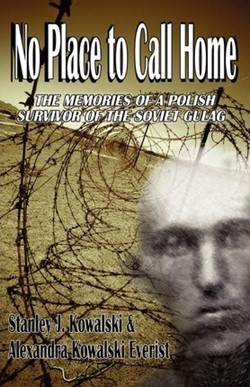A Polish Survivor of the Soviet Gulag (Kolyma, Siberia)

No Place to Call Home - The Memories of a Polish Survivor of the Soviet Gulag
Stanley J Kowalski and Alexandra Kowalski Everist
2009
ISBN 9780982058756
Riverview Fla: JimSam
98 Books about Poland | Polish War Graves in Britain
In late August 1939 Stanislaw (Stanley) Kowalski, 19 years of age, had just completed one year of military training. He was now a Cadet Officer and joined the 51st Infantry Regiment on the south eastern frontier of Poland. On the 1st September Nazi Germany invaded Poland and nearly three weeks later the Soviet Union attacked Poland from the east.
Stanislaw Kowalski was captured by the Soviets and imprisoned in a tobacco factory in Monasterzyska. He escaped and made his way home to his parents in Jazlowiec.
On 13 April 1940 there was heavy pounding on the door of the family home. The Soviet Secret Police (NKVD) had come to deport them to Khazakstan. Stanislaw Kowalski wasn't there but his parents and brother were sent on the long train journey to Khazakstan in cattle trucks. Stanislaw was later arrested by the NKVD and imprisoned in Czortkow prison. His sojourn in the Soviet Gulag had begun.
Starobielsk Prison Camp
On 20 February 1941 he left Czortkow prison and together with other prisoners was loaded into cattle trucks for a train journey that would take him east. Seven days later they passed through Kiev (Ukraine) before arriving after twelve days at a place called Starobielsk. There they were taken to what was once a Russian Orthodox monastery.
...the prisoners incarcerated in the cargo cars were unloaded...and marched over muddy streets toward the ex-monastery with its round Byzantine cupolas. They marched unaware that they were walking in the footsteps of the Polish officers of Katyn and Miednoje. The tragedy that resulted in their brutal murder had not yet been revealed. The NKVD had brutally murdered over 3,900 Polish officers confined there just months prior... (p. 83)
Starobielsk was one of the prison camps in which thousands of Polish Officers had been kept before being murdered by the NKVD in what has become known as the Katyn Massacre.
Journey to Kolyma
On 15 June 1941 Stanislaw Kowalski left Starobielsk and was again placed on board a train of cattle trucks. He was now about to embark on a very long journey which would take him by train over the route of the Trans-Siberian railway. After a number of weeks he eventually arrived in the Soviet Far East at a place called Buchta Nakhotdka near the city of Vladivostok. From there he and other prisoners were taken by barge to a cargo ship moored in the bay called Dzhurma.
The cargo ship Dzhurma carried within her hold up to 12,000 prisoners destined for extinction...packed like sardines, prisoner movements were limited to the space occupied by their bodies...In the middle of the Japan Sea, the Dzhurma encountered a violent typhoon...Soon the sickly smell of vomit joined the stench of the latrine spills, making a sickening mess of the entire hold's interior...On the eighth day of the sea journey, this voyage finally reached...the promised land of Kolyma. (pp. 100-110)
Kolyma is in the remote far north-east of Russia. It is partly located in the Arctic Circle and has very cold winters. Stanislaw was taken to a labour camp to work in a gold mine called Pryisk Pioneer which had about 250 prisoners.
Amnesty and Freedom
In the autumn of 1941 it was announced that the Poles in the camp had been granted amnesty. They were free men. An agreement between the Soviet Union and the Polish government-in-exile in London had been signed which involved the release of all Polish prisoners in the Soviet Union. This agreement was in response to the attack on the Soviet Union by Nazi Germany in June 1941.
Stanislaw and other prisoners were taken to Magadan to await transport to Vladivostok. It was not until after Christmas 1941 that Stanislaw boarded the vessel Dalstroy which sailed for Buchta Nakhodka and arrived there on 12 January 1942. The men were given train tickets to Novosibirsk and Stanislaw made the long train journey once again over the route of the Trans-Siberian railway in search of the reforming Polish Army.
Stanislaw arrived in Novosibirsk and then made his way to Barnaul (Western Siberia) before proceeding to Khazakstan in search of his family. He eventually found them in a place called Wtoraja Piatyletka. There he was able to rest and recover from his experiences in the Soviet labour camps.
In February 1942 he received notification from the Polish authorities to report for military duty. He was given a railway ticket to Uzbekistan to join a Polish unit. In March 1942 he journeyed from Uzbekistan to the port of Krasnovodsk on the Caspian Sea. On an oil tanker, overcrowded with Poles escaping from the Soviet Union, he sailed to the Persian port of Pahlevi. On 1st of April 1942 his arrival in Persia meant that after nearly three years of captivity he was finally free. It would however be 15 years before Stanislaw would see his family again.
Stanislaw (Stanley) Kowalski died on 29 March 2013 aged 92.
- Dark Side of the Moon (Polish Deportations) - Zoe Zajdlerowa
- Crater's Edge: A Polish Family's Epic Journey Through Wartime Russia - Michal Giedroyc
- The Silver Madonna - Eugenia Wasilewska (Polish Deportation to Kazakhstan)
- Janek Leja - A Polish Survivor of Siberian Labour Camps
- Paying Guest in Siberia - Maria Hadow (Polish Deportations to Kazakhstan 1940)
- Polish Deportations to Kazakhstan 1940 (Unsettled Account - Eugenia Huntingdon)
- Polish Deportations to Kazakhstan 1939-41 - Wesley Adamczyk (Siberia)
- Shallow Graves in Siberia - Michael Krupa (Polish Deportations)
- A Forgotten Odyssey - The Untold Story of 1,700,000 Poles Deported to Siberia in 1940
- The Ice Road - Stefan Waydenfeld (Polish Deportations, Siberia)